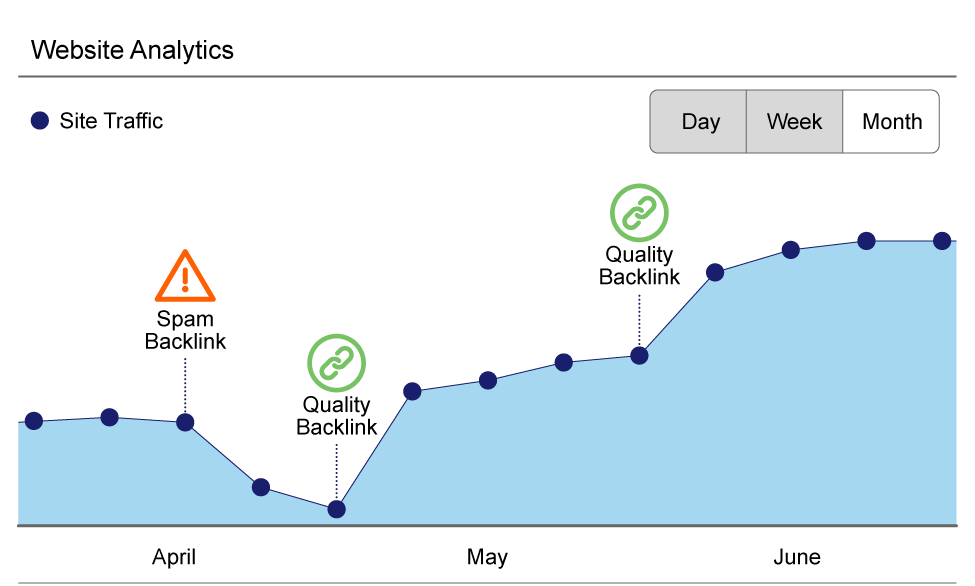Why Backlinks to Your Website Are Key to SEO

Businesses with exceptional brand authority and substantial numbers of website visits use backlinks as an integral part of their search engine optimization (SEO) strategy.
Backlink building is an essential element of every successful SEO strategy. And here’s why.
Backlinks 101
Backlink building is the process of acquiring links to your website from other channels that direct traffic from their content to yours. Backlinks are the hyperlinks that point to your website. Other website authors believe your content is valuable and link to it from their webpage. Also called external or inbound links, backlinks add credibility to your site. That’s why effective digital marketing programs include link building in their SEO strategy. In fact, Google considers backlinks a vital signal when evaluating a website’s value and ranking its content. As a result, Google ranks pages with lots of backlinks higher. Especially when backlinks come from trusted, authoritative sources. So when your site shows up on the first page of search engine results, it indicates to visitors that your site offers valuable content.
As we know, all search engines—not just Google—use backlinks as a measure of value. Simple, right? Not so fast. Where they come from and how they’re used matter more than you’d think.
Quality links that support SEO
The quality of the website linking to your own determines how much of an SEO boost a backlink will earn you. The best links come from trusted sites with high authority, such as news outlets and Fortune 500 companies. For example, Forbes, TechCrunch and HuffPost are almost guaranteed to boost your site’s SEO. A link from these trusted sources shows Google your content is relevant and high quality.
So, the more quality sites that link to your website, the higher its SEO authority. Search-engine crawlers also use backlinks to move around the web and discover new pages.
As businesses became savvier to the ways of Google’s site ranking, they realized the number of external links pointing to their website was critical. Unfortunately, this led to some unscrupulous link-building activity in the early days of site ranking that forced the search giant to tighten the rules surrounding backlinks.
The wrong kind of backlinks
Some might think, “If links are so important, why not just pay for a bunch of backlinks?” Buying backlinks or agreeing to a link exchange email, where someone links to your site if you link to theirs, sounds easy but could cost your business more than you think. These practices are intended to manipulate rankings in your favour, but these spammy backlinks can do the opposite resulting in Google penalizing your content and your site ranking.
Deceptive tricks to stay away from include buying backlinks in bundles from websites set up purely to link (this is called link-farming) and spamming forum discussions with irrelevant links. Also, always avoid opting in to spammy backlinks from spammy sites.

By contrast, a good SEO strategy cultivates organic, authentic and helpful backlinks relevant to the people clicking them.
How to get great backlinks to your website
There are several ways to encourage high-authority websites to link to yours.
Create quality content
First and foremost, create content that people want to share. Well-written articles that provide a comprehensive review of a topic are a good start. Then, enrich it with study results, illustrations, diagrams and videos, and now you’ve got a strong reference source to which others are more likely to link. Examples include helpful how-to downloadables, entertaining reviews, research study articles and one-of-a-kind analysis.
Submit media releases
A press release can work wonders for securing backlinks from high-authority news outlets, providing you have something to say. Pitch your quality content idea to the press, targeting journalists who have previously covered similar topics. For B2C brands, this might be an introduction to an innovative new product; for those targeting B2B writers, insightful industry data will often generate a buzz.
Write guest posts
Sometimes it makes sense for a website to feature a guest post authored by a related industry expert or collaborator. The purpose can be to share joint research and case studies—unique and informative content that’s useful to website visitors. Naturally, the post would include backlinks to the author’s business websites. It’s important to note that Google recommends using nofollow links for these, so the link doesn’t directly impact search ranking. Instead, if people share the content and link to it as a resource, you can benefit from brand exposure and increased website traffic. In addition, visitors who stick around and engage with your content help improve your SEO authority.
Social influencers
Influencer marketing is a growing field, and for good reason. Influencers are individuals with a large social media following or a successful blog. A backlink from an influencer who is relevant to your brand and shares a similar audience could offer a serious boost in brand awareness and organic traffic. And similarly to guest posts, if people click through to your website and explore your other content, this can support your SEO goals.
The many benefits of quality backlinks
Backlinking has the power to increase search engine ranking and website authority. Therefore, it is a crucial cornerstone of all good off-page SEO strategies.
Backlinking also supports wider content marketing objectives. Articles that include links to your content can drive more traffic to your website. Users that click through may develop into customers or share your content with their social network, further increasing brand awareness and sales potential.
So, yes, the ongoing investment in backlinks and SEO is worth the effort! It involves both strategically creating original, engaging content that can attract quality backlinks and then actively encouraging relevant links and shares from quality sites. Your business benefits from increased brand awareness, more website visits by people interested in your expertise and higher brand authority.
Want to learn more about brand awareness and how Mindspin can help? Read Brand Strategy: The Effective Way to Successfully Grow Your Brand.
Tanja Groos, Founder and CEO, Mindspin® Studio Inc.
Tanja Groos is CEO Mindspin with more than 20 years of experience in branding and digital marketing. Her work has been published and awarded. Her leadership has tripled sales within a year, surpassed top industry competitors online, and enhanced brand credibility for her clients.
Follow Tanja on LinkedIn












